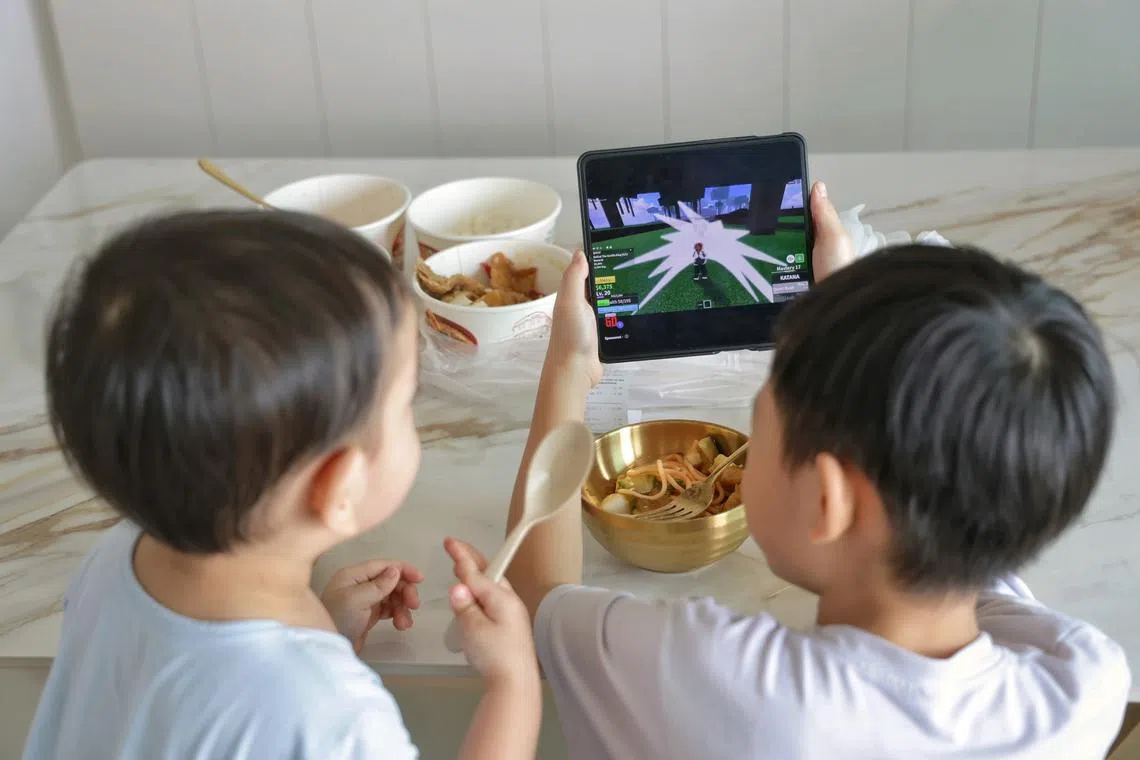Concerned about your children getting too much screen time? Here’s how to dial back
Sign up now: Get ST's newsletters delivered to your inbox

MOH released its updated guidelines on Jan 21, to help parents manage the use of screens among young children.
ST PHOTO: KEVIN LIM
SINGAPORE - Many parents turn to screens to entertain or distract their children, as well as for learning.
The Ministry of Health released its updated guidelines on Jan 21,
These include not giving children screen time during meals and one hour before bedtime.
Children younger than 18 months old should also not be allowed screen use, unless for video calls, and those under the age of seven should not be exposed to screens in the background.
Here are some alternative activities for parents trying to limit screen time.
During meals
Instead of using screens to get children to remain in their seats while waiting for food to arrive at a restaurant:
Pack a “busy bag” with items such as magnets, a colouring book or small toys from home, so children are engaged through play, says Ms Rowena Mark Ramos, 37, head of curriculum at Babilou Family Singapore. For example, they can create different shapes with magnets, colour with crayons, or pretend play with small dinosaurs.
Play a round of Would You Rather with silly food-related questions like “Would you rather eat a giant strawberry or a tiny watermelon”, to encourage conversation and hone language skills, says Ms Amelia Jaishree, lecturer at the National Institute of Early Childhood Development.
Instead of letting your child watch cartoons as they sit through a meal, this is what Ms Jaishree suggests:
Eat as a family and have conversations. Talk about the food they are eating, and ask questions so that they are engaged.
Let your child arrange food on their plate, like making a “food face” or a mini scene to make mealtimes more interactive.
Play a guessing game where your child closes their eyes and guesses what food they are eating based on taste or smell, to enhance their senses.
When parents are busy
Instead of using screens to occupy your children while you run errands or do household chores:
Let them share household responsibilities by bringing them grocery shopping, asking them to help transfer clothes from the laundry basket into the washing machine, getting them to fold their own clothes and providing them a small broom so they can sweep while you vacuum. Ms Rowena says children can also help with the easier aspects of cooking such as transferring food, mixing or sprinkling salt.
Get your child involved in cleaning tasks by challenging them to see how quickly they can pick up toys or put away items, says Ms Jaishree.
When travelling
Instead of using screens to pass the time during long commutes, Ms Jaishree suggests the following:
Count things you see like buses, bikes or trees and turn it into a fun competition.
Play a game of “I Spy” with colours, shapes or objects outside the vehicle.
To keep infants and toddlers entertained, bring along quiet sensory toys like fidget spinners, squishy balls, or textured objects for them to explore.
Play guessing games with older children to hone questioning skills.
For learning
Instead of teaching children about the beach by playing a video of the beach, Ms Rowena suggests visiting East Coast Park so that they can feel the sand, hear the sounds of the waves, smell the air and observe the sea creatures on the shore for a more authentic learning experience.
Instead of using a drawing app for your child, Ms Jaishree suggests laying out big sheets of paper on an open space and get your child to safely finger paint a “giant masterpiece” on the floor to hone visual perception and spatial awareness.
She also recommends replacing spelling apps with writing letters on paper plates and hopping from one to another to spell out words. This helps to build language and physical development at the same time.
Others
Instead of using a bedtime story app, Ms Jaishree says using a torch to make shadow puppets on the wall while telling a bedtime story will help to settle your child down for the night.
Parenting coach and digital literacy educator Carol Loi advises avoiding using screen time for activities such as gaming or watching videos as a reward for finishing school work. This reduces the intrinsic motivation for learning and makes children crave screens even more. They may also rush through their schoolwork to get this reward rather than learn meaningfully.
Elisha Tushara is a correspondent at The Straits Times, specialising in Singapore’s education landscape.



